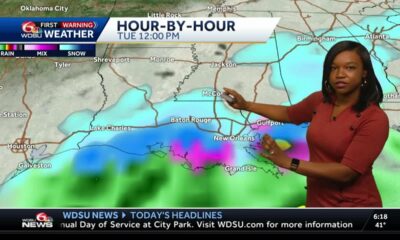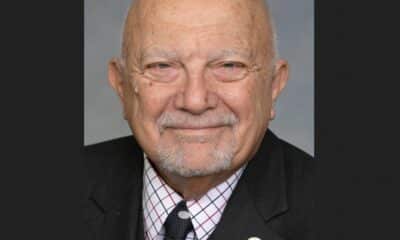News from the South - North Carolina News Feed
More lead testing results back, with good results • Asheville Watchdog
In its first appearance at a Tropical Storm Helene briefing since before Christmas, the Asheville Water Resources Department delivered more good news for customers regarding lead testing results and improving turbidity at North Fork Reservoir.
Spokesperson Clay Chandler said the water system has returned to full corrosion control protection, if it was ever fully lost. Corrosion control helps prevent lead from leaching from private plumbing into tap water.
Chandler said Wednesday the water department has posted 1,200 results for lead testing, and they show 24 tests came back with detectable levels of lead on the first draw of water, and nine of those exceeded the EPA-established action limit of .015 parts per billion.
Of 1,175 “flush samples,” taken after letting the water run, five had detectable levels of lead, three of which were “right at the detection limit,” Chandler said. Two surpassed the EPA-established action level limit.
He said the city identified a couple of issues with those customers, and remediation steps have been taken. The city has said previously that it has no lead in its distribution line piping, but lead can enter taps from private plumbing, particularly in homes built in or before 1988, when lead solder and pipes was banned.
The city announced Nov. 14 that lead had been detected in seven schools after lead mitigation treatments had been suspended 19 days, resuming Oct. 30. The announcement resulted in thousands of customers – about 7,000 total – requesting lead testing kits. No students drank the water during that time frame.
The city restored potable water Nov. 18 and has insisted it is safe to drink.
Health officials emphasize that no level of lead, which can cause development problems in children and has other healthy impacts, is safe.
The lead “detects” in the city system continue to share a commonality, Chandler said, which is that the customers’ water systems “have all been sitting dormant for an extended period.” The city still recommends customers let the water run for 30 seconds before using, or until they notice a temperature change, typically to cooler water.
The city also conducted a resampling of its existing lead and copper sampling pool, sites that are tested every three years as part of compliance with the North Carolina Department of Environmental Quality’s lead awareness program. Of those 51 sampled sites in December, three had a detectable level of lead on the first draw and one was over the action level.
The city sampled the same sites in July, before Helene, and got the same results.
“So that is very good news, because we have comparative sampling data on that sampling pool from over the years, and essentially nothing has changed,” Chandler said. “That’s pretty strong evidence that if corrosion control was ever lost — and there’s not a whole lot of evidence that it was — that it is all the way back. We are obviously very, very happy with that.”
The city previously noted that the lead mitigation program was reinstated Oct. 30 and would take 30 to 90 days to reform the protective coating to prevent lead from leaching into pipes in older homes.
The lead results put the city “still well within the 90th percentile” target required by the EPA and the DEQ. That means at least 90 percent of the first draw samples, if they have detectable lead, must be under the action limit.
“I think we’re actually at like 98.9 percent,” Chandler said.
In early December, two outside experts raised concerns about the lead in city water and recommended more testing.
Chandler said the city has given out about 7,000 test kits and will continue running tests, although he doesn’t expect all of those kits handed out will be tested.
“We don’t think every single one of those is going to come back,” Chandler said. “For example, we’ve had a lot of people ask us to take them off the list as we post results on the website.”
Chandler said lead test kit pickup and drop-off continues to be available from 9 a.m. to 5 p.m., Monday through Friday, at Asheville City Hall, and at three local libraries from 10:30 a.m. to 5 p.m., Tuesday through Saturday. Those branches are the North Asheville Library at 1030 Merrimon Avenue, the East Asheville Library at 3 Avon Road and the West Asheville Library at 942 Haywood Road.
The last day to pick up a test kit from the libraries is Jan. 28, and the last day to drop off at the libraries is Friday, Jan. 31.
“Water Resources strongly encourages our customers who want to lead test kits to pick one up and drop it off before Jan. 31,” Chandler said. “Then our capacity to get test kits to the lab and the results back to the customers is going to be significantly decreased as we return to normal operations.”
Turbidity continues to improve
Chandler also said turbidity continues to improve at North Fork Reservoir, which provides 80 percent of the city’s drinking water, and an Army Corps of Engineers mobile treatment project is operational.
Helene essentially turned North Fork upside down, and turbidity surged in the 350-acre lake. Measured in Nephelometric Turbidity Units (NTUs), turbidity initially stood at 79 NTUs after the storm, resulting in water one city official compared to chocolate milk.
The city restored mostly untreated water to most customers by mid-October, but it had a strong chlorine odor and was discolored, as it was essentially lake water. Clean, potable water returned a month later.
Still, reservoir turbidity remained stubbornly high through much of the fall. As of Dec. 18, it stood at 10.2. On Wednesday, Chandler said it’s down to about 7.
After treatment, turbidity at customers’ taps is extremely low.
“Once that water passes through our filters and our treatment systems, turbidity is around .08, .09, right around there,” Chandler said.
Pre-Helene, turbidity in the raw water at North Fork typically stood around .5, and the city would like to get it back to that level.
“Again, I just don’t think that’s possible with the level of damage that we have in the watershed,” Chandler said, referring to downed trees and muddy washouts.
The city has found that its system can handle higher turbidity than previously thought, but it does require more backwashing and is not a good long-term solution.
The Army Corps of Engineers portable filtration system, which treats higher turbidity water, has helped the city meet demand, which actually has increased since the storm. The Corps contracted the six-month, $39 million project to a private firm.
While tourism has been down drastically since the storm, water usage is up, Chandler said.
“Our average daily demand is right at 25 million gallons a day,” Chandler said. “Before Helene, that number was between 18 and 20 (MGD).”
Chandler did not know what’s driving the increase, although he said some recent breaks of 6- and 8-inch lines due to extreme cold could be a contributing factor.
The city has the capacity to meet demand. North Fork can push out 31 million gallons of treated water a day, and the city’s treatment facility on the Mills River in northern Henderson County another 7 million gallons daily.
“If we had a demand of like 38 million gallons, we could meet it, but we would be redlining our operations,” Chandler said.
Asheville Watchdog is a nonprofit news team producing stories that matter to Asheville and Buncombe County. John Boyle has been covering Asheville and surrounding communities since the 20th century. You can reach him at (828) 337-0941, or via email at jboyle@avlwatchdog.org. The Watchdog’s local reporting during this crisis is made possible by donations from the community. To show your support for this vital public service go to avlwatchdog.org/support-our-publication/.
Related
The post More lead testing results back, with good results • Asheville Watchdog appeared first on avlwatchdog.org
News from the South - North Carolina News Feed
Joe John, longtime North Carolina lawmaker and judge, dies • NC Newsline
SUMMARY: Rep. Joe John, an 85-year-old North Carolina Democrat, passed away on Wednesday after resigning from the House due to terminal cancer. In his resignation statement, he expressed his hope that his legacy of dedication to justice and advocacy for the voiceless would inspire future leaders. John’s family described him as a devoted public servant and a loving grandfather. He served four full terms in the House and was recently elected to a fifth term. His commitment to fairness and compassion left a lasting impact on many, with colleagues praising his integrity and leadership abilities. His district will soon select a replacement.
The post Joe John, longtime North Carolina lawmaker and judge, dies • NC Newsline appeared first on ncnewsline.com
News from the South - North Carolina News Feed
New allegations about Pentagon nominee Hegseth circulated to members of U.S. Senate • NC Newsline
SUMMARY: New allegations against Pete Hegseth, President Trump’s nominee for defense secretary, have raised concerns over his past behavior. A sworn affidavit from his ex-sister-in-law accuses him of alcohol abuse and misconduct, including causing his second wife to fear for her safety and being publicly intoxicated during a National Guard drill. These allegations, along with past claims of sexual misconduct, have led to scrutiny from Senate Democrats, particularly Sen. Jack Reed. Hegseth denies the accusations, calling them part of a smear campaign, while his second wife has denied physical abuse. The Senate is expected to vote on his confirmation soon.
The post New allegations about Pentagon nominee Hegseth circulated to members of U.S. Senate • NC Newsline appeared first on ncnewsline.com
News from the South - North Carolina News Feed
Losing state Supreme Court candidate Griffin now seeks to disqualify thousands of votes in Buncombe and 3 other Democratic-leaning counties
The losing Republican candidate for the state Supreme Court is attempting a new and controversial tactic to flip the outcome of the Nov. 5 election: erasing the absentee ballots of 5,059 active-duty military and American citizens living abroad who are registered in Buncombe and three other Democratic-leaning counties.
Jefferson Griffin of Raleigh, a former state appellate judge, came up 734 votes short in an attempt to unseat incumbent state Supreme Court Associate Justice Allison Riggs, a Democrat. Despite two recounts and a decision by the state’s Board of Elections naming Riggs the winner, Griffin refuses to concede.
Backed by the Republican National Committee and the state Republican Party, he filed a lawsuit to block the Board of Elections from certifying Riggs’s victory. The state Supreme Court, operating with a 5-1 Republican majority as Riggs has recused herself from the case, has agreed to consider the lawsuit.
Although Griffin’s challenge cites no voter fraud, he alleges that clerical errors should disqualify as many as 66,000 voter registrations. The lawsuit asks the state Supreme Court to throw out those ballots and then recount the remainder in each of North Carolina’s 100 counties.
Latest challenge targets blue counties
Those targeted ballots fall into two groups. The first and largest group of about 60,000 ballots across the state were cast by voters in person during the early-voting period. Among those targeted ballots are 1,596 from Buncombe County, which voted by a nearly two-to-one margin against Griffin.
The second group now being targeted by Griffin – including 5,059 voters — has become the focus of his strategy to upend the Nov. 5 count. It is crafted to disqualify a disproportionate number of Democrats in targeted counties to give the Republican the victory.
This group consists entirely of American citizens living overseas. It includes military personnel; Foreign Service and federal government employees; missionaries; and academics studying or teaching abroad. The ballots are cast in accordance with the federal Uniformed and Overseas Citizen Absentee Voting Act (UOCAVA), which allows Americans living overseas to register as absentee voters in a state of their choice.
Griffin alleges that these voters should be disqualified because they failed to provide photo IDs with their ballots. The North Carolina State Board of Elections ruled before last year’s election that UOCAVA voters do not need to provide photo identification.
The investigative-reporting initiative ProPublica reported Tuesday that Griffin, while in the North Carolina Army National Guard, cast absentee ballots in 2019 and 2020 under the UOCAVA program. His campaign declined comment to a ProPublica reporter.
Griffin’s lawsuit asks the state Supreme Court to erase those military and overseas ballots in only four of North Carolina’s 100 counties: Buncombe, Durham, Guilford and Forsythe. Democratic Party voters constitute a majority or plurality in each of those counties, and each voted heavily in favor of Riggs, the incumbent Democrat.
“It’s very clear that this is not about election integrity,” a spokesperson for Riggs told Asheville Watchdog. “This is Griffin’s ‘hail-Mary’ attempt to overturn the election. It’s even beyond last ditch.”
In Buncombe County alone, Riggs defeated Griffin by 42,620 votes. If the state Supreme Court agrees with Griffin’s request to throw out the 2,692 challenged Buncombe ballots from both groups, the Republican candidate could surpass the 734 votes he needs to win.
Blowback from military voters
Griffin hasn’t disguised the partisan goal of this tactic. In the opening brief filed with the high court seeking to block the State Elections Board from certifying Riggs’ victory, Griffin argues that “if the Court agrees that overseas voters should have presented a photo identification, there will probably be no need for the Court to reach the other two election protests,” including nullifying the remaining group of 60,000 ballots cast in the early voting period in all 100 counties.
If the military absentee votes are disqualified but the outcome doesn’t shift to Griffin’s advantage, the GOP lawsuit states, it intends to continue pursuing the other protests.
But this tactic also risks blowback from across the political spectrum. Several military voters named in the lawsuit were contacted by The Watchdog through text messaging; all reacted with disapproval to Griffin’s targeting of voters without evidence of fraud.
“Being military and serving in countries where the people did not have the ability to vote, has highlighted the importance of the precious right,” Bobby Buckner, 55, a registered Republican, wrote. “I would caution this candidate that eroding or challenging our rights to vote because someone does not like the outcome, goes against the very reason I chose to serve my country: freedom and the ability to have a voice.”
“I hope [Griffin] will realize the importance of our service members’ right to vote and will reconsider this challenge and the costly price to freedom that overturning our votes would be,” Buckner wrote.
Chase Tipton, an unaffiliated voter who declined to say where he is stationed, said he didn’t know about the lawsuit until contacted by The Watchdog.
“I signed to serve my country and have followed proper protocol for casting my vote from out of state,” he replied. “My vote should count the same as any other.”
Hospital Corpsman Doug Davis, who wrote that he is deployed with the Fleet Marine Force in the “Central Command Area,” which encompasses the Middle East, said he also was unaware that his ballot was being challenged.
“Per federal law, my ballot was valid,” Davis wrote. “[Griffin’s] actions are not only illegal, but it discourages service members from voting.”
As for Griffin’s refusal to concede, Davis wrote: “That’s ridiculous. He should just take his loss.”
Final briefs are due to the state Supreme Court by the end of this week. No timetable has been set for a decision.
Meanwhile, a counter-lawsuit brought by the State Board of Elections to move the case into federal court is going forward in the federal Fourth Circuit Court of Appeals. The suit argues that the state Supreme Court, with its overwhelming Republican majority, isn’t capable of objectively ruling on fellow-Republican Griffin’s case. Arguments are scheduled for Jan. 27 in that lawsuit.
Asheville Watchdog is a nonprofit news team producing stories that matter to Asheville and Buncombe County. Tom Fiedler is a Pulitzer Prize-winning political reporter and dean emeritus from Boston University who lives in Asheville. Email him at tfiedler@avlwatchdog.org. The Watchdog’s reporting is made possible by donations from the community. To show your support for this vital public service go to avlwatchdog.org/support-our-publication/.
Related
The post Losing state Supreme Court candidate Griffin now seeks to disqualify thousands of votes in Buncombe and 3 other Democratic-leaning counties appeared first on avlwatchdog.org
-

 News from the South - Georgia News Feed7 days ago
News from the South - Georgia News Feed7 days agoGeorgia senator arrested for trying to defy ban on entering House chamber
-

 News from the South - Georgia News Feed6 days ago
News from the South - Georgia News Feed6 days agoU-Haul: South Carolina the fastest growing state in the country
-

 News from the South - Tennessee News Feed5 days ago
News from the South - Tennessee News Feed5 days ago‘Don’t lose hope’: More than 100 Tennesseans protest incoming Trump administration
-

 News from the South - Louisiana News Feed6 days ago
News from the South - Louisiana News Feed6 days agoTracking weekend rain and chances for wintry weather
-

 News from the South - Louisiana News Feed5 days ago
News from the South - Louisiana News Feed5 days agoTracking wintry weather potential
-

 News from the South - Louisiana News Feed6 days ago
News from the South - Louisiana News Feed6 days agoSoutheast Louisiana officials brace for freezing temperatures
-

 News from the South - Tennessee News Feed6 days ago
News from the South - Tennessee News Feed6 days agoSpeed limit reduced on State Route 109 in Wilson County
-

 News from the South - Kentucky News Feed5 days ago
News from the South - Kentucky News Feed5 days agoFalling Saturday temperatures

































